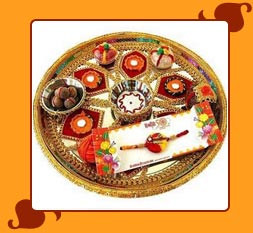Rakshabandhan or Rakhi Festival is
celebrated all over India with great enthusiasm and faith.There is a
tradition of sisters tying the Rakhi or the sacred thread on brother's wrist
while performing arti of brother and praying for his long life. Brothers'
present Rakhi Gifts to their sister and promise to protect her always. This
simple custom of Rakhi is being carried forward since ancient times.

Any
festival in India is incomplete without the typical Indian festivities, the
gatherings, celebrations, exchange of sweets and gifts, singing and dancing.
Rakhi festival is the celebration of togetherness and love and trust between
the family members specifically between the brothers and sisters. It is the
celebration of brothers and sisters.
It is one festival that
primarily belongs to the North and Western regions of India but celebrated
throughout the country with the same verve. Regional celebrations may be
different but Raksha bandhan has become an integral part of those customs.As
per the traditions, the sister on this day prepares the pooja thali with
diya, roli, chawal and rakhis. She worships the deities, ties Rakhi to the
brother(s) and wishes for their well being. The brother in turn acknowledges
the love with a promise to be by the sisters' side through the thick and
thin and gives her a token gift.
An Insight of Rakhi
RitualsOn the day of Rakhi, sisters prepares the pooja thali with
diya, roli, chawal, rakhi thread and sweets. The ritual begins with a prayer
in front of God, then the sister ties Rakhi to her brother and wishes for
his happiness and well-being. In turn, the brother acknowledge the love with
a promise to stand by his sister through all the good and bad times.
Sisters
tie Rakhi on the wrist of their brothers amid chanting of mantras, put roli
and rice on his forehead and pray for his well-being. She bestows him with
gifts and blessings. In turn, brothers also wish her a good life and pledges
to take care of her. He gives her a return gift. The gift symbolizes the
physical acceptance of her love, reminder of their togetherness and his
pledge. The legends and the reference in history repeated, the significance
of the festival is emphasized.
Unconditional Bond of
LoveRaksha bandhan has been celebrated in the same way with the
same traditions for many years. Only the means have changed with the
changing lifestyle to make the celebration more elaborate and lively. This
day has an inherent power that pulls the siblings together. The increasing
distances evoke the desire to be together even more. All brothers and
sisters try to reach out to each other on this auspicious day. The joyous
meeting, the rare family get-together, that erstwhile feeling of brotherhood
and sisterhood calls for a massive celebration. For everyone, it is an
opportunity to reunion and celebrate. People also share tasty dishes,
wonderful sweets and exchange gifts. It is a time to share their past
experiences also. For those who are not able to meet each other, rakhi cards
and e-rakhis and rakhis through mails perform the part of communicating the
rakhi messages. Hand made rakhis and self-made rakhi cards are just
representation of the personal feelings of the siblings.
The
Legends of RakhiThe Shravana or the monsoon month carries all hues
and shades of nature and emotions. Religiously speaking Shravan is a pious
month and full moon of this all-important month is considered to be a very
holy day. It is celebrated in different ways for different reasons almost
throughout the country. For the siblings it is the eternal tie of love, for
Brahmins the day to take the pledge of Brahmanik rites and for those who
depend sea and monsoon, it is the beginning of the new season.
Indian festivals are based on the weather changes and their significance in
the lives of people but they do have a story to support the celebrations.
The rich Indian Mythology provides a religious reason to celebrate the day
in a specific way. Many epics are related to the day and the origin of
Raksha Bandhan. The festival finds a mention in most of the epics and its
origin can be traced back to the mythological Pouranik times.
The
Legend in the Bhavishya PuraneThe legend refers to a war between
the Gods and the Demons. The demon King Brutra was advancing and the Gods
lead by lord Indra, were on verge of defeat. The king of Gods, Indra
approached Guru Brihaspati to find a solution to the situation. Brihaspati
asked Indra to tie a sacred thread on his wrist, powered by the sacred
mantras on the Shravan Purnima. Lord Indra's Queen Sachi also called
Indrani, empowered the thread and tied it on to his hand on the decided day.
The power of the sacred thread called Raksha helped the Gods to victory. The
tradition of thread tying still continues. It is a gesture of goodwill.
The Legend of King Bali and Goddess LaxmiAccording
to another legend Demon King Bali was a great devotee of Lord Vishnu. Lord
Vishnu had taken up the task to guard his kingdom leaving his own abode in
Vaikunth. Goddess Laxmi wished to be with her lord back in her abode. She
went to Bali disguised as a Brahmin woman to seek refuge till her husband
came back.
During the Shravan Purnima celebrations, Laxmiji tied
the sacred thread to the King. Upon being asked she revealed who she was and
why she was there. The king was touched by her goodwill for his family and
her purpose and requested the Lord to accompany her. He sacrificed all he
had for the Lord and his devoted wife. Thus the festival is also called
Baleva that is Bali Raja's devotion to the Lord.It is said that since then
it has been a tradition to invite sisters in Shravan Purnima for the thread
tying ceremony or the Raksha Bandhan
Rakhi PurnimaThe
festival is also known as Rakhi Purnima as it falls on the full moon day of
the Hindu month 'Shravana'. The month of Shravana is the month of gods and
pujans (worships) and the full moon day being the most important day of all.
Rakhi Purnima is important in more than one way. Since, the festival is
celebrated in many states, it is known with many names and rituals but the
only thing that does not change is the prayer and pledge for the protection
of siblings.
Different regions seems to have different belief
behind and follow different rituals. In the Western Ghats, the rakhi is
considered to be an offering to Lord Varuna - the Lord of the sea. Lord
Varuna is offered Coconuts. On this day, coconuts are thrown into the sea as
a ritual. Here, the festival of Rakhi is known as Nariyal Purnima, and it is
also marked as the beginning of fishing season.
Avani
Avittam in South India In South India, Raksha Bandhan is called
Avani Avittam. The festival is important for Brahmins. They first take a
holy bath and then change their holy thread (Janeyu) amid chanting the
mantras.
They take a pledge to perform the brahmanik duties as
prescribed in the holy books and adopt a good conduct and dignity. The
Janeyu is a representation of the vow for adherence to vedic culture,
observance of Hindu traditions and service to humanity. The ceremony is
called Shravani or Rishi Tarpan. All Brahmans celebrate it in the same way.
Kajari Purnima in North IndiaKajari Purnima
is the name by which the festival of Rakhi is known in North India. The
festival is celebrated when wheat and barley are sown in this region.
Goddess Bhagwati is worshiped and farmers seek her blessings for a good
crops. The name Baleva signifies the might of King Bali and his devotion to
lord Vishnu and Goddess Laxmi. In Gujarat people offer water to the
Shivalinga every Monday of the month.
On the Rakhi Purnima they
offer water and pray to God for forgiveness. In one ceremony known as
Pavitropana, a few twisted filaments of cotton are soaked in panchagaivya
(mixture of cow's ghee, milk, curd, urine and excreta) and then fastened
around a shivalinga. In Scriptures, Raksha Bandhan is described as 'Punya
Pradayak' which means a day that bestows boons to the generous 'Vish Tarak'
the destroyer of venom or the vicious 'Pap Nashak' the destroyer of sins.






